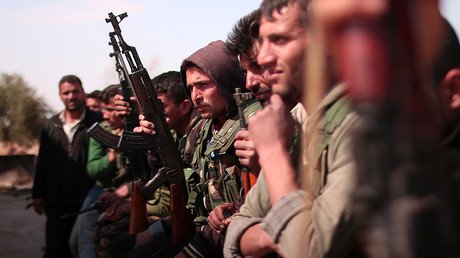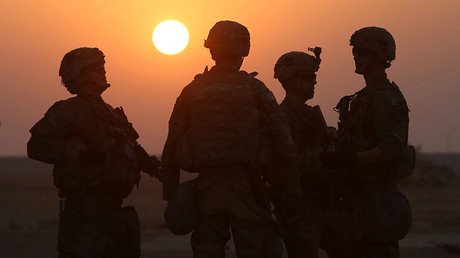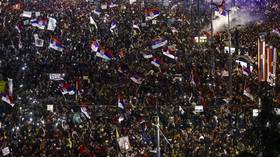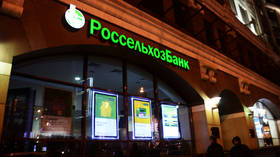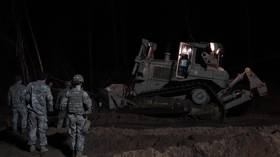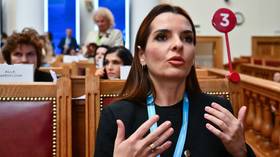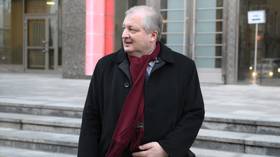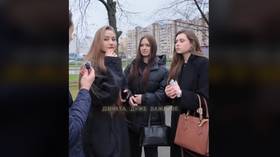Manbij crossfire: Liberated from IS, Kurdish-controlled city now fears Turkish invasion (EXCLUSIVE)
Months after Kurdish-led forces kicked Islamic State out of Syria’s Manbij, change is in the air with IS-imposed burqas replaced by a women’s council. Now, however, the city finds itself on the edge of the Turkish-Kurdish conflict, RT’s Lizzie Phelan reports.
The US-backed, Kurdish-dominated Syrian Democratic Forces (SDF) liberated Manbij, some 135 kilometers (84 miles) from the Islamic State (IS, ISIS/ISIL) stronghold of Raqqa in August 2016. While many of the buildings still lie in ruins, the city’s bustling hum is apparent, Phelan reports from Manbij.
Good morning from #Manbij#Syriapic.twitter.com/H7v3HbnWxw
— Lizzie Phelan (@LizziePhelan) 25 марта 2017 г.
The city seems gradually returning to the way of life it enjoyed before the occupation of jihadists, who enforced their radical interpretation of Islam onto locals after overrunning the city in 2014. Under IS rule, Manbij women were effectively banned from leaving their homes and had to adhere to a mandatory dress code, covering themselves in head-to-toe burqas. Following the city’s liberation, the images of women burning and ripping off these garments went viral, becoming a symbol of resistance to fanatical terrorist rule.
1.locals say #Manbij bus station was #ISIS execution site. Tree (pictured) grew spontaneously on top of hole where woman was stoned to death pic.twitter.com/GK6sVIFjvb
— Lizzie Phelan (@LizziePhelan) 25 марта 2017 г.
The contrast between what the residents of the city had to endure under Islamic State and what they experience now is striking, Nour, a young woman, told Phelan, saying that “there was no life for us, we just lived – eating and drinking, everything was prohibited.”
“But right now, things have progressed and Manbij has developed. Thank God all institutions, schools, everything have reopened and are better than before. Honestly, we didn't expect this development,” she added.
Women in Manbij have gone a step further, setting up their own council to gain control over their future. RT’s Phelan witnessed the opening of the council on March 25, attended by dozens of local women wearing colorful headscarves.
#Manbij#Women's Council inaugurated today. For years women could barely leave their houses under #ISIS rule. #Syriapic.twitter.com/pFKzOpKerK
— Lizzie Phelan (@LizziePhelan) 25 марта 2017 г.
Not only women’s life has changed dramatically following liberation, life has been breathed into the whole city, which is now swarming with locals and cars. People are streaming into the reopened shops that sell everything from snacks to jeans.
Zacharia, a jeans store owner, told Phelan that local businesses have been reassured by the current situation in the city.
“Manbij right now is being run very well, there is no looting. Girls and children go out... there is no pressure on them. We don’t need better or worse, what we have now is perfect for us,” he said.
READ MORE: Kurds ‘will be involved’ in liberating Raqqa from ISIS – US general
Buses are running from Manbij to other parts of Syria, in particular to the capital, Damascus, through the city of Azaz, controlled by Turkey-backed rebels from the Free Syrian Army (FSA). Azaz is some 32 kilometers (20 miles) northwest of Aleppo – and just five kilometers from the Turkish border.
'Deter aggression': US troops spotted in armored convoy near Manbij, #Syria (VIDEO) https://t.co/84oll1aEIwpic.twitter.com/NultGQh4Bl
— RT (@RT_com) 6 марта 2017 г.
The proximity of Manbij to Turkish troops, who view Kurdish militias including the YPG, part of the SDF, as terrorists, has now become a major concern for the locals, who now fear that a new confrontation, this time between the SDF and Turkish troops, can spell another war inside the city, Phelan reports.
Turkey claims the growing strength of the Kurdish militias may enable them to pursue the fight for a so-called Greater Kurdistan, which includes eastern Turkish territories as well as parts of Syria and Iraq. The Syrian Kurds, however, deny they have any designs on foreign lands.
“On the ground, there is only military cooperation to fight terrorism and liberate areas controlled by radicals… The idea we will extend our project [to Greater Kurdistan] is not true because our project is based on a shared and democratic vision, all parts of the community participate,” Kemal Berkel, deputy executive president of the city’s Kobane canton, told Phelan.
“This makes many sides unhappy, because they don’t want to see an end to the Syrian crisis, they want it to continue,” he said.
READ MORE: Syria calls on UN to ‘force’ Turkey to withdraw troops
The Turks have claimed that the Kurds are oppressing the city’s Arab population, but locals who talked with Phelan did not appear to have any need for “liberation” from the Turkish troops.
“We don’t like Erdogan, we like the SDF – we don’t want either Turkey or the FSA,” a woman said.
“We don’t want Turkish involvement, the situation here is very good and comfortable… why would we need someone to come and occupy our territory?” a man called Mahmoud said.
Turkey has been supporting the FSA on the ground since its army’s incursion into Syria in August 2016 within the Operation codenamed Euphrates Shield. While the goal of the intervention was stated by the Turkish authorities as targeting IS positions along the Syrian-Turkish border, Kurdish militias have been arguing that they are the real target of the Turk offensive.
As the conflict risked spiraling into a full-blown war between Turkish forces and the US-backed SDF on Syrian territory, the Pentagon used the tense situation as a pretext to dispatch hundreds of Marines to Manbij in early March. At the time, Sharfan Darwish, spokesman for the Manbij Military Council, justified the deployment of forces by “the increase in Turkish threats to occupy the city,” citing incidents of sporadic exchanges of fire that had already occurred outside Manbij between Kurdish and Turkish forces.
Meanwhile, the dispatch of US forces was condemned by the Syrian authorities, with Syrian President Bashar Assad calling the uninvited troops “invaders,” arguing that the presence of the US military only destabilized the situation.
The US “didn’t succeed anywhere they sent troops, they only create a mess; they are very good in creating problems and destroying, but they are very bad in finding solutions,” Assad said in an interview with Chinese media earlier in March.
